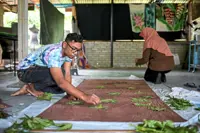Proud moment: Ezry (second from right) and Mezba (right) posing with their Piala Seri Endon award together with their friends Badrul Hisyam (left) and Mohd Izswan Sidek. Photos: Zulhelmy Hamdan
Zulhelmy Hamdan has been in high spirits ever since he emerged as first runner-up at the Piala Seri Endon Batik Design Competition (handicraft category) for ecoprint fabric two months ago.
Winning the trophy meant a lot to the Kulai, Johor-based Felda youth, as it serves as an affirmation that he made the right choice to quit his earlier job as a senior technician to heed his passion.
Get 30% off with our ads free Premium Plan!






